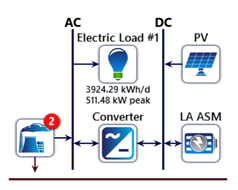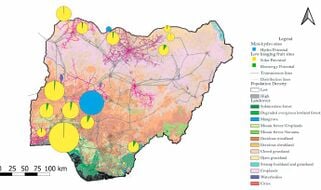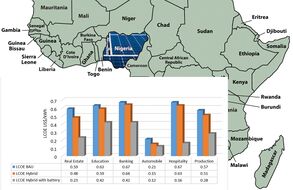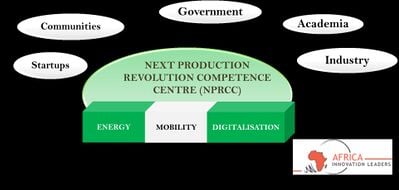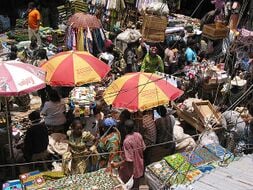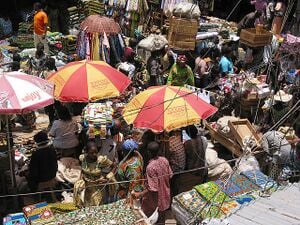
 The climate cafe helping eco-anxious Africans find hope amid the heat, positive.news (Mar 11, 2024)
The climate cafe helping eco-anxious Africans find hope amid the heat, positive.news (Mar 11, 2024)  How a Nigerian ecofeminist grew a climate movement, chinadialogue.net (Mar 08, 2024) — After witnessing the violent impacts of warming, Oladosu Adenike started a national movement empowering young people to take action
How a Nigerian ecofeminist grew a climate movement, chinadialogue.net (Mar 08, 2024) — After witnessing the violent impacts of warming, Oladosu Adenike started a national movement empowering young people to take action The village that stood up to big oil – and won, The Guardian (Jun 01, 2022)
The village that stood up to big oil – and won, The Guardian (Jun 01, 2022)
Climate action[edit | edit source]
- Nigerian Youth Climate Coalition
- Carbon Brief Profile: Nigeria, carbonbrief.org, 17 February 2023, added 16:38, 24 February 2023 (UTC)
Community involvement[edit | edit source]
Federal Ministry of Finance Whistleblowing Portal
Reduce, reuse, repair and recycle[edit | edit source]
Environmental issues[edit | edit source]
The key environmental issues in the Niger Delta of Nigeria relate to its petroleum industry.
The delta covers 20,000 km² within wetlands of 70,000 km² formed primarily by sediment deposition. Home to 20 million people and 40 different ethnic groups, this floodplain makes up 7.5% of Nigeria's total land mass. It is the largest wetland and maintains the third-largest drainage basin in Africa. The Delta's environment can be broken down into four ecological zones: coastal barrier islands, mangrove swamp forests, freshwater swamps, and lowland rainforests.
This incredibly well-endowed ecosystem contains one of the highest concentrations of biodiversity on the planet, in addition to supporting abundant flora and fauna, arable terrain that can sustain a wide variety of crops, lumber or agricultural trees, and more species of freshwater fish than any ecosystem in West Africa. The region could experience a loss of 40% of its inhabitable terrain in the next thirty years as a result of extensive dam construction in the region. The carelessness of the oil industry has also precipitated this situation, which can perhaps be best encapsulated by a 1983 report issued by the NNPC, long before popular unrest surfaced:
- We witnessed the slow poisoning of the waters of this country and the destruction of vegetation and agricultural land by oil spills which occur during petroleum operations. But since the inception of the oil industry in Nigeria, more than twenty-five years ago, there has been no concerned and effective effort on the part of the government, let alone the oil operators, to control environmental problems associated with the industry'. W
Biological remediation[edit | edit source]
The use of biological remediation has also been implemented in areas of the delta to detoxify and restore ecosystems damaged by oil spills. Bioremediation involves biological components in the remediation or cleanup of a specific site. A study conducted in Ogbogu located in one of the largest oil producing regions of Nigeria has utilized two plant species to clean up spills. The first stage of cleanup involves Hibiscus cannabinus, a plant species indigenous to West Africa. H. cannabinus is an annual herbaceous plant originally used for pulp production. This species has high rates of absorbency and can be laid down on top of the water to absorb oil. The oil saturated plant material is then removed and sent to a safe location where the hydrocarbons can be broken down and detoxified by microorganisms. The second stage of bioremediation involves a plant known as Vetiveria zizanioides, a perennial grass species. V. zizanioides has a deep fibrous root network that can both tolerate chemicals in the soil and can also detoxify soils through time requiring little maintenance. The people of Ogbogu hope to use these methods of bioremediation to improve the quality of drinking water, soil conditions, and the health of their surrounding environment.
Within the Imo State of Nigeria, a study was conducted in the city of Egbema to determine the microfloral communities present at the site of an oil spill. These microorganisms have the ability to break down the oil, decreasing the toxic conditions. This is recognized as another method of bioremediation and scientists are trying to determine whether the properties these microorganisms possess can be utilized for the cleanup of future spills.
However bleak this situation may seem for the Niger Delta region there are clearly alternatives that can be implemented to save it from future contamination. Satellite imagery combined with the use of Geographical Information Systems (GIS) can be put to work to quickly identify and track spilled oil. To hasten the cleanup of spills, regional cleanup sites along the problem areas could help contain spills more quickly. To make these tasks feasible more funding must be provided by the stakeholders of the oil industry. Nongovernmental organizations will keep fighting the damaging effects of oil, but will not win the battle alone. W
Deforestation in Nigeria[edit | edit source]
As of 2005, Nigeria has the highest rate of deforestation in the world according to the Food and Agriculture Organization of the United Nations (FAO). Between 2000 and 2005 the country lost 55.7% of its primary forests, and the rate of forest change increased by 31.2% to 3.12% per annum. Forest has been cleared for logging, timber export, subsistence agriculture and notably the collection of wood for fuel which remains problematic in western Africa. W
About Nigeria[edit | edit source]
Located in the West African region by the gulf coast [1], Nigeria is the most populous country in Africa and 7th in the world with a growing population of not less than 200 million [2]. By the year 2050, the country is expected to rank 3rd largest in the world by population, surpassing the United States of America. In terms of GDP, it also rank among top 3 in African continent. Following the 2013 economic rebasing which increased her GDP from USD 270 to 510 billion [3], the country moved from being second to become the highest GDP in Africa and 26 largest in the world. The development in the country's private sector was a critical pivot to this economic status. Nigeria also boast of many resources, including human and natural resources for productive use. Abuja is the capital territory of Nigeria, while Lagos state is the industrial and commercial center.
Pages in category "Nigeria"[edit | edit source]
References


